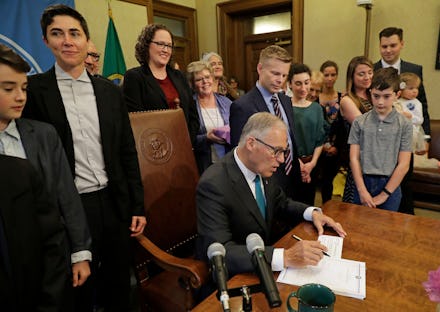In 2020, Washington residents will be able to turn dead bodies into soil

On May 22, Washington governor Jay Inslee signed legislation that makes composting human bodies legal in the state starting in 2020. The law, which is a first in the nation, permits the practice of “aboveground decomposition,” according to The New York Times. It serves to encourage an alternative to traditional burials or cremation for people seeking to "return to the Earth" in a more environmentally friendly way.
The process involves placing a body into a vessel where it is nestled among a combination of straw, alfalfa, and wood chips. Then, the vessel is closed and rotated while maintaining a consistent temperature and moisture. Eventually, the mixture of natural materials creates an environment that allows the body, including the bones and teeth, to decompose into compost soil.
It's a similar method farmers use for deceased livestock, noted NBC News. The process, however, takes some time. A 2018 study conducted by Washington State University found that it took about 30 days before bodies became a soft, odor-free soil that lacked contaminants such as chemicals from tooth fillings.
Recompose, a company that plans to offer aboveground decomposition funeral services, estimates there will be "carbon savings over a metric ton per person." And friends and family can either take home all the soil (approximately a cubic yard of soil per person), take home just a small portion, or donate the soil to the company to "nourish conservation land in the Puget Sound region."
This method is ideal for people who want to continue giving back to the environment even after their death. In a press release from Recompose, the company claims this burial method "uses 1/8 the energy of cremation and saves over a metric ton of CO2 per person," which could save "the equivalent of the energy required to power 54,000 homes for a year." In contrast, cremation burns 28 gallons of fuel for a single body and releases 540 pounds of CO2 into the air. Traditional burials also use far more materials to rest a body, with the amount of wood necessary for caskets equating to 4 million square acres of forest every year, according to Safe Passage Urns. And casket burials require land space for graveyards — which is a problem given the growing issue of the shortage of urban cemetery spaces. The use of formaldehyde to embalm bodies is also toxic to the Earth and funeral workers, reported the Berkeley Planning Journal, with 27,060 gallons of embalming fluid used per year in the U.S.
Composting bodies as a process isn't necessarily for everyone, of course. The Catholic Church, for example, has already denounced the practice, stating that "disposing human remains in such manner fails to show enough respect for the body of the deceased." But other environmental and funeral advocates feel this law is a step in the right direction in giving people alternative burial options.
“I think this is great,” said Joshua Slocum, director of the Funeral Consumers Alliance, to the Seattle Times. “In this country, we have a massively dysfunctional relationship with death ... and a lot of our state laws stand in the way of people returning to simple, natural, uncomplicated, inexpensive ways of doing things.”